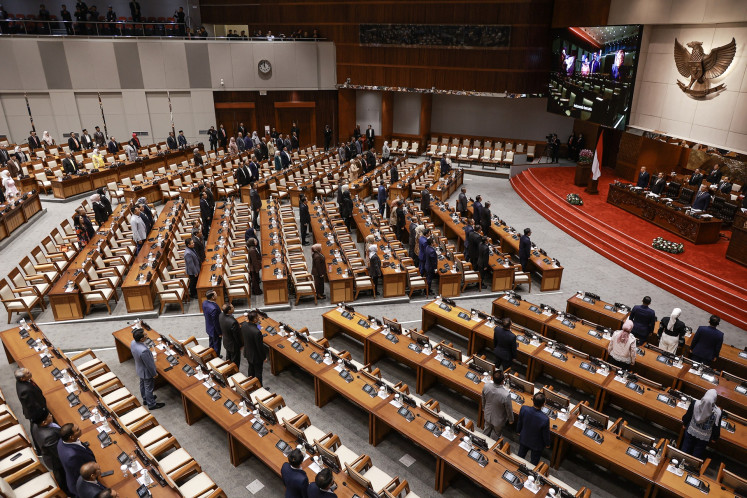Popular Reads
Top Results
Can't find what you're looking for?
View all search resultsPopular Reads
Top Results
Can't find what you're looking for?
View all search resultsIn search of Indonesian jazz
Dwiki Dharmawan (left) and String QuartetIndonesian jazz performers are globally renowned for fusing the archipelago’s rich traditional sounds into their music
Change text size
Gift Premium Articles
to Anyone
Dwiki Dharmawan (left) and String Quartet
Indonesian jazz performers are globally renowned for fusing the archipelago’s rich traditional sounds into their music.
Some music experts say that the resulting mix is worthy of its own genre, while musicians — true to their calling and reluctant to define the music they play — say that jazz is jazz.
Prominent drummer Gilang Ramadhan acknowledges that there are a lot of Indonesian jazz musicians who experiment with traditional music, including himself.
“Some have described themselves as playing ethno jazz, which in certain respects is an acceptable labeling,” Gilang said during a discussion in South Jakarta recently.
Ever since its emergence at the beginning of the 20th century — born out of a mix of African and European music traditions — in the southern part of the US, jazz has been introduced, evolved and rediscovered throughout the world.
Balawan BifanThe musical style has spawned many subgenres, like big band swing, bebop and the numerous phrases with jazz in the name: avant-garde jazz, Afro-Cuban jazz, Latin jazz, soul jazz, jazz fusion and acid jazz.
“There is no limit in mixing jazz with other musical styles, not to mention the tendency of jazz musicians to always be creative, breaking new ground,” Gilang said.
With improvisation being a key element in the musical style, jazz musicians will always aspire to make their own individual interpretations of the music.
“It’s only natural that Indonesian jazz musicians look to our traditional music for inspiration. We are born and raised with it, it’s right in front of our eyes,” Gilang said.
Not to mention, he continued, the rich variety of traditional music across the archipelago.
“There are so many inspirations to take from, from Sabang to Merauke, from Bali, West Java, Central Java, Sulawesi. One region alone contains so many musical tones; Indonesia is incredibly wealthy music wise,” he said.
Indonesian musicians receive great appreciation whenever they include traditional elements for foreign audiences abroad.
“I only have to use a rhythm from Balinese music as an additional element and jaws will drop. Little does the audience know that we have so many to use back home,” he said.
Gilang, however, would not give a clear answer as to whether Indonesian jazz was a distinct genre in the jazz spectrum. “Most of us — Indonesian jazz musicians — tinker with traditional music; let’s just put it that way,” he said.
Indro Hardjodikoro
Rising young jazz musician Barry Likumahuwa said that he did not agree with the term “Indonesian jazz”.
“What would be more correct would be jazz in Indonesia; jazz that grows in Indonesia,” said the bassist.
Barry made the analogy that a karawitan — classic traditional Javanese music ensemble — thriving in California would not be called a Californian karawitan.
“It would be funny to call the music Indonesian jazz. It’s jazz music played with an Indonesian flavor,” Barry said.
He pointed out that not all experiments using traditional Indonesian music worked in jazz.
American trumpeter Maurice Brown (left) and bassist Barry Likumahuwa“There’s a lot to consider: different rhythms, different music scales, different patterns and many others. A successful play would result in seamless, fluid music; not merely attaching the traditional music to jazz,” said Barry, who is the son of prominent jazz musician Benny Likumahuwa.
“However, I don’t think we need to over-complicate this. Let jazz be jazz,” he said.
Agus Setiawan, activist and founder of jazz portal wartajazz.com, said that he agreed that a distinct label of “Indonesian jazz” did not exist.
“However, at the same time it is an inevitable label used by music journalists to describe jazz played by our musicians,” Agus said. He considers the label as part of an effort by the music community to make a certain space for Indonesian jazz musicians.
“I agree that it’s less about Indonesian jazz as a genre, but more of a distinction of jazz produced by Indonesian musicians.
“But it’s a process; it’s still rolling. We just do it. The ultimate judge is the audience,” he said.
Senior music journalist Frans Sartono said that the affinity for using elements of traditional music in their performances by Indonesian jazz musicians was part of an ongoing process.
“I see Indonesian jazz musicians looking for identity and this affinity is part of the process,” Frans said.
The tendency to utilize traditional music had been going on for a long, long time. “The legendary Indonesian jazz pianist Bubi Chen was among the pioneer musicians to use traditional elements,” he said.
Bubi, who died last year at the age of 74, was already widely known in Australia, Europe and the United States, by the 1960s.
Indra Lesmana
Bubi and another jazz legend Jack Lesmana were credited with adding an Indonesian flavor to jazz music especially at a time when then president Sukarno discouraged western music.
Together with the Indonesian All Stars, which included Maryono, Benny Mustafa, Kiboud Maulana and Jopie, Bubi and Jack recorded the phenomenal album Djanger Bali, which mixed jazz with Indonesian traditional music, after attending the Berlin Jazz Festival in 1967.
“Indonesian jazz musicians use traditional elements for big events, both domestic and abroad, to present special performances, something different from their weekly gigs,” he said.
Frans said that hesitancy in using the label “Indonesian jazz” was no longer necessary.
“In jazz, we have recognized Afro-Cuban jazz for example,” he said referring to a musical style that mixes Afro-Cuban clave-based rhythms with jazz harmonies and techniques of improvisation.
“I don’t think we need to be afraid of using the term ‘Indonesian jazz’,” he said.
— Photos by P. J. Leo














